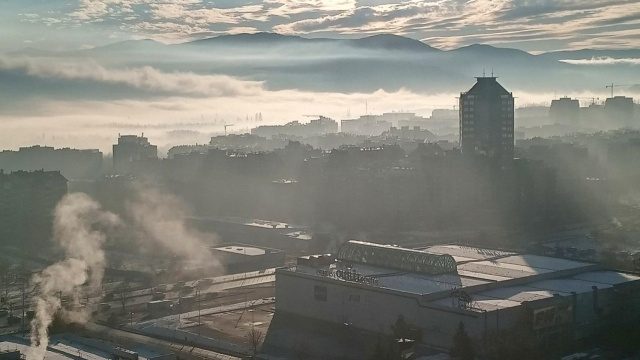
“Cities Across Bulgaria Face Double the Safe Limits, Prompting Municipal Urgency and Public Concern”
Sofia, Bulgaria: In a distressing revelation, several key cities in Bulgaria are grappling with alarming levels of air pollution, far exceeding established safety thresholds.
Both the official European air quality index and the Bulgarian civil platform, airbg.info, have raised red flags, urging immediate attention and action to address this burgeoning crisis.
The European Environment Agency’s index has painted a bleak picture of poor to terrible air quality in cities such as Sofia, Plovdiv, Smolyan, Dimitrovgrad, Nessebar, Sliven, Gorna Oryahovitsa, Pleven, and Ruse.
Simultaneously, airbg.info has identified Kyustendil, Velingrad, Troyan, Sevlievo, and extensive regions in Sofia as severely polluted, underscoring the widespread nature of this environmental predicament.
The surge in air pollution, surpassing the average daily limit of 50 micrograms per cubic meter for fine dust, has been attributed to a trifecta of causes: domestic solid fuel usage, emissions from road transport, and adverse weather conditions.
In response to this crisis, municipal authorities in Sofia are urgently advocating for increased reliance on public transportation as a critical mitigation measure.
Despite the situation’s urgency, the municipal authorities have yet to disclose details of the “green ticket” eco measure, introduced in 2019, allowing a 1 BGN per day fare when acceptable dust levels exceed 150 micrograms.
This measure could play a pivotal role in incentivizing the public to opt for eco-friendly transport alternatives during periods of heightened pollution.
The Metropolitan Municipality is also advising citizens to take proactive measures, including avoiding idling car engines for more than three minutes.
Households relying on wood or coal heating are encouraged to switch to more ecological alternatives like electric heating devices, contributing to a collective effort to curb pollution at its source.
Further demonstrating their commitment to addressing the crisis, the Metropolitan Inspectorate has intensified inspections at car repair shops, construction sites, and unauthorized waste-burning areas, aiming to mitigate pollution sources and enforce environmental regulations more rigorously.
Health experts are emphasizing the critical need for action, particularly for vulnerable populations. Individuals with respiratory ailments, young children, and the elderly are strongly advised to minimize prolonged outdoor exposure during these periods of severe pollution.
Recommendations also underscore the importance of choosing routes away from significant city boulevards and busy streets while walking in an effort to reduce personal exposure to harmful pollutants.
As Bulgaria confronts this dire air quality crisis, urgent and coordinated efforts are essential to safeguard public health and the environment.
The need for immediate action is evident, and both authorities and citizens must work collaboratively to adopt sustainable practices that can mitigate the impact of air pollution and secure a healthier future for all.
This article was created using automation technology and was thoroughly edited and fact-checked by one of our editorial staff members
